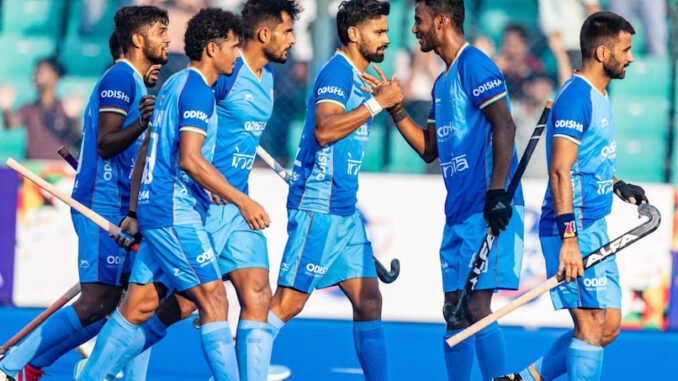
“‘We Have to Man Up’: India Coach Craig Fulton Slams Team After Pro League Debacle”…see more…
India’s men’s hockey journey in the recent FIH Pro League took a dramatic nosedive during its European leg—a collapse so severe that head coach Craig Fulton did not mince words. Addressing a virtual media conference, Fulton declared: **“We have to man up and be accountable. I want to fix it. And they know they can fix it.”**
A Dream Turned Nightmare
Coming into the Pro League, India boasted a robust start. At home in Bhubaneswar, they secured 15 points from eight games and entered the European leg with momentum and hope. Yet what followed was disastrous: seven straight losses, the longest losing streak in the history of Indian men’s field hockey at any international tournament. Their final tally: just 3 points from eight games abroad, landing them eighth out of nine teams and dashed hopes for a direct World Cup qualification slot .
Among the defeats were narrow losses—six out of seven were by a single goal, and at one point, India led Australia 2-0 before capitulating . The loss to Belgium (3‑6) epitomized the nightmarish European campaign that saw the team concede late and lose composure under pressure .
Fulton: Owning the Fallout
At the heart of the media session, Fulton accepted full accountability.
> “I’ll take full responsibility for maybe not having prepped the group the way it needed to be prepped … we can’t brush that under the carpet,” he admitted .
He underscored that many losses boiled down to “small moments”—defensive restarts, penalty-corner execution, even “outletting under high pressure”—factors that individually seem minor but collectively crippled performance .
Yet Fulton’s confidence in his squad remains unshaken. “You win or you learn,” he reminded, pointing to previous turning points, such as after an earlier 0‑5 drubbing in Australia, which preceded a historic Olympic upset victory over the same side .
Hurt and Deeper Diagnosis
The Pro League setback also revealed structural issues in the squad. Star captain and drag‑flick specialist Harmanpreet Singh suffered a severe finger injury mid‑tour after being struck by a ball. His enforced absence of 4.5 games robbed India both of skill and leadership . Fulton acknowledged the disruption, saying the team had to discover who could step up—and it remains a task to balance Harmanpreet’s workload as the tournament schedule intensifies .
Moreover, the campaign exposed a lack of secondary penalty‑corner threats. Fulton laid out plans to identify supportive drag‑flickers such as Amit Rohidas and Jugraj Singh, addressing both short‑term competition readiness and long‑term succession .
Asia Cup: The Make‑or‑Break
With Pro League hopes dashed, India’s next—and only immediate—opportunity for World Cup qualification is the Asia Cup in Rajgir, scheduled from August 27 to September 7 . The winners go straight to the 2026 World Cup in the Netherlands and Belgium (August 14–30) .
Fulton emphasized this as a hard reset: “That’s our priority for the year—100%.” The squad will reconvene on July 14 and train intensively until Asia Cup day, including a planned stint in Australia for acclimatization and match practice .
He also flagged respect for Asia Cup rivals while affirming India’s ambition: to remain No. 1 in Asia, countering rising competition .
India A: Building Depth
Back in Europe, India A is touring Ireland and the Netherlands in what Fulton called “crucial” matches for the senior team’s future . The logic is clear: with the 2026 World Cup fast approaching—and the Asian Games too—a two‑tier structure has been established. Top players will shuttle between squads, ensuring fitness, form, and fresh options during crunch transitions .
Planned training camps include some 40‑47 players, split between senior and A teams, reinforcing depth and readiness ahead of a loaded calendar .
Historical Perspective
Under Fulton, India tasted Olympic glory—clinching Bronze in Paris 2024, their first Olympic medal since 1980—fueling optimism . The recent collapse, however, echoes a troubling regression from that high.
As recent coverage from The Times of India notes: “Barely a year after Paris Olympics high, India hockey team crumbles under pressure to concede late,” highlighting concerns over sustained intensity . This underlines the challenge Fulton faces in regaining momentum and faith.
The Road Ahead: Tasks on the Agenda
Technical Refinement: Emphasis on restarts, defensive structure, and penalty‑corner efficacy—areas identified as key turning points.
Injury Management: Ensuring Harmanpreet remains available and at peak pace while managing minutes wisely.
Flicking Depth: Strengthening drag‑flick options via Rohidas, Jugraj, and others—a key tactical need.
Psychological Resilience: Instilling a sense of accountability—the mantra of “manning up”—to overcome mental blocks.
Squad Strengthening: Active monitoring of India A to provide credible backup and ease rotation during intense periods.
What’s at Stake?
For India, Asia Cup isn’t just another tournament—it’s a lifeline. A win secures World Cup qualification. A stumble means forced reliance on global qualifiers, risking fixture congestion and fatigue ahead of major tournaments like the Asian Games and World Cup.
Final Word from Fulton
“You win or you learn,” Fulton concluded. For a team fresh off Olympic glory, the Pro League collapse is humbling. But as he braces for the Asia Cup, the message is clear: own the mistakes, use them as fuel, and deliver a resounding bounce‑back. The clock is ticking—Asia Cup awaits.
—
In Summary:
India performed well at home but flopped abroad, sparking a record seven-game losing streak.
Fulton accepted full responsibility, pinpointing technical lapses and squad depth as key issues.
With key players injured and secondary options still developing, Asia Cup becomes a critical test.
Lessons learned in Europe now
must be turned into Asia Cup resilience and renewed dominance.
Leave a Reply